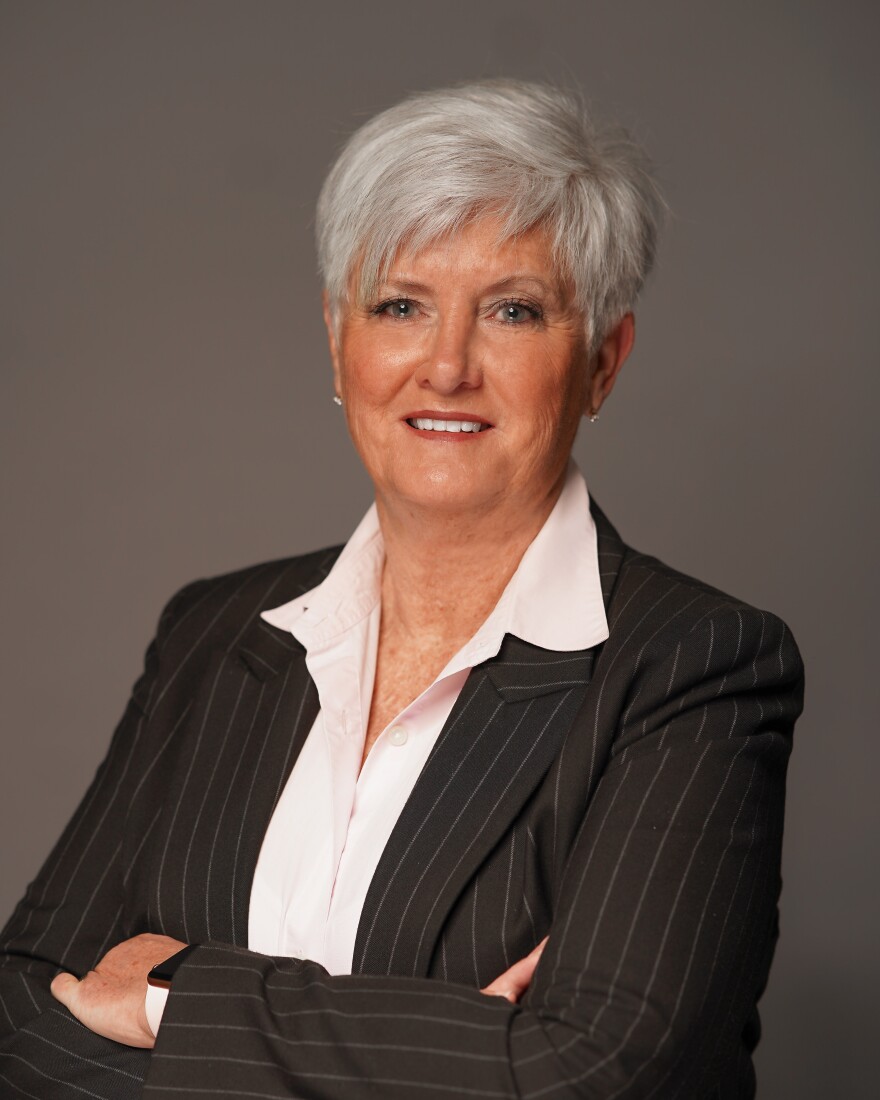Sometime this past Saturday, Joann Anderson reached something close to a breaking point.
She's the CEO of UNC Health Southeastern Hospital in Robeson County. If there's a ground zero in this wave of COVID in North Carolina, it's there along the border with South Carolina. Much of the population in Robeson County is low income and at risk. They've seen a massive spike in cases. And the vaccination rate is just 27%.
So Anderson took to Facebook and unloaded, saying she's "totally frustrated, disappointed and angry."
Anderson spoke to WUNC about what she's seeing. This conversation has been edited for length and clarity.What's it like in your hospital right now, and for the past week or so?
Chaos is about the only thing I can say. I know that's a horrible word to use for hospital. But right now there's a high level of stress. There's a lot of anxiety from the staff. People are tired. And these are people that are working, you know, 12 to 16-hour shifts, for 5 or 6 days in a row. They keep coming back for more. They're trying really, really hard to do anything they possibly can. And, you know, in many cases, I just feel like it's futile. We're a resilient group of people. But that resilience is wearing down right now.
How would you describe the population of people with COVID in your hospital right now?
We we've had some kids - the youngest one that we've had was two weeks old. So yes, the children are getting it as well. But for us right now, the population is younger than it was last year.
When we had the peak last year, we were in the 65-67 range in terms of the age. Today, we're in the upper 40s. So it's a younger population. The ICU beds are full of COVID. Not all are on ventilators today. So that's good. A couple of days ago, everybody in there was on ventilators. Unfortunately, we've had four deaths in the past 36 hours. So others have been moved in to the ICU that weren't that critical.
Today, none of the patients that are COVID positive have been vaccinated. Not any of them. None of the ones that have been vaccinated were in the ICU. And we've had no deaths from vaccinated individuals.
We are doing a lot more outpatient of monoclonal antibodies, trying to keep people out of the hospital. We have patients holding in the emergency department waiting for a bed. So in my opinion, we're in a dire situation.
Monday, unfortunately, we had to have a conversation about - if we got to the point where we had to look at how resources were allocated, what would our decision making be? I don't want to ever get to that point. I don't want to have to say - or have a team member or a group of people make a decision - of who gets a ventilator and who doesn't or who gets ICU and who doesn't. We don't need to get to that point. I mean, there's a there's a way to prevent that.
UNC Healthcare instituted a vaccine mandate for staff members last month. Did that have an impact? Are you seeing staff members who are unvaccinated? And how do you how do address that?
Unfortunately, we have a very low percentage of employees that are vaccinated: we're just over 50%. So I have about 48% of my employee base today that are not vaccinated. And you know, I've pleaded, I've encouraged, I've incentivized, I've done everything I possibly can to get them to get vaccinated. And it came down to 'Okay, I'm just gonna have to mandate it.' Because if I'm going to protect the staff, if I'm going to protect our providers and our community, we need to be leading the cause for vaccination.
So staff is not required to have had their vaccinations completed until September 21. We were giving them time to get both doses, and we've seen individuals take the vaccine since that mandate. But on Monday, I still had 800 (staff members) that were not vaccinated. So now I'm trying to figure out how many are going to stay unvaccinated and how do I backfill 800 positions?
We're in a community where our staff is reflective of the community. But if our staff isn't taking the vaccines and their families aren't taking the vaccine and their friends aren't taking the vaccine... We're doing all kinds of events. We will go anywhere, vaccinate anybody that's willing to be vaccinated. So we have seen an uptick in that over the last few days.
One of the lines that stuck with me from the Facebook post was you said it "appears to be a public health battle consumed by a political divide." How's that dynamic playing out in Robeson county and in your hospital?
Well, you know, there are a lot of people who just are from the political arena, conspiracy theorists, and they go back to 'how did this even get started?' And some people think it's contrived, and that it's not even real. And, you know, a lot of that is being fed from the political side of things. And this is not a political issue. This is a public health crisis issue. And public health should be resolving this, not the politics.
And so you know, I'm just begging people to, you know, respect our politicians, they have their jobs to do, but their jobs are not to tell us how to resolve healthcare issues. We have to do that ourselves. And it comes from educating ourselves and making sure that we follow the science. The science is telling us what we need to do. The data is there, we just need people to buy into it and be willing to take the vaccine. And if they're not going take the vaccine, well, you know, wear your mask, don't put yourself in a situation where you're going to be exposed or expose it to other people.
What's the next one to three months going to be like there? And what can you possibly do to prepare for what's coming?
The prediction for us right now, from our analytics team, is that we should peak somewhere at the end of September or October. So the next five to six weeks are going to be really, really tough. I hope we don't get to the point where we have to make decisions about who gets a bed and he doesn't get a bed. I'm hoping that over the next six weeks, we see more people become vaccinated so that we can start that downward trend earlier than October.
The other fear that I have is that we're seeing flu in the community already. So if we don't get a handle on COVID, and we have a bad flu or RSV season, we're just exacerbating the situation. And these are all respiratory illnesses, they're all going to affect those that are already immunocompromised, or have weakened respiratory systems. And I just want people to understand you can't layer on top of that, and expect the health system to be able to manage all of that at one time.
So the next six weeks are going to be very tough for us. We're going to have a lot of sleepless nights trying to figure out, do we have enough staff? Do we have enough beds? Do we have enough medication? Can we get everybody in and how do we how do we manage it. You know, I have a great team, they're going do everything they possibly can. But they can only be stretched so far.







